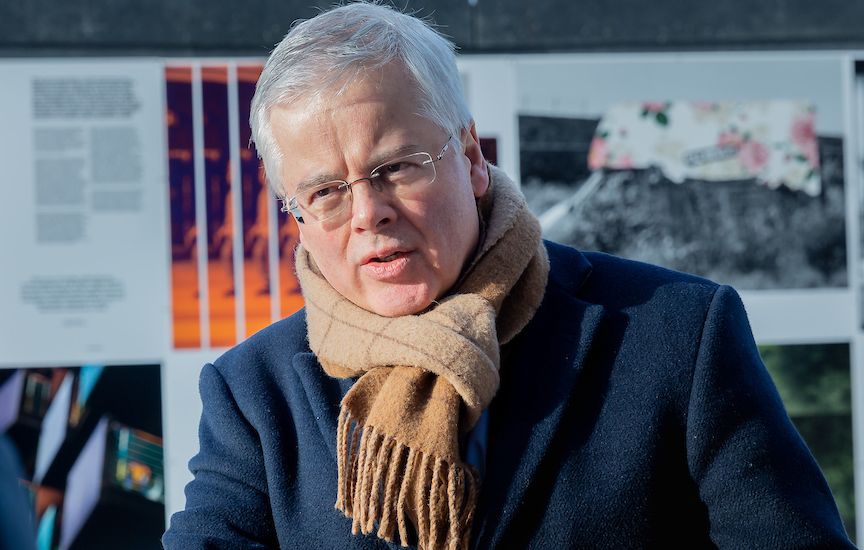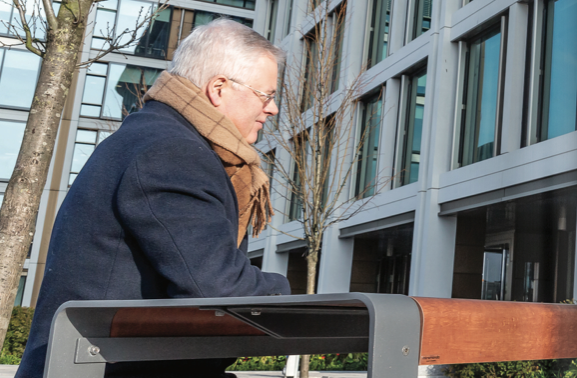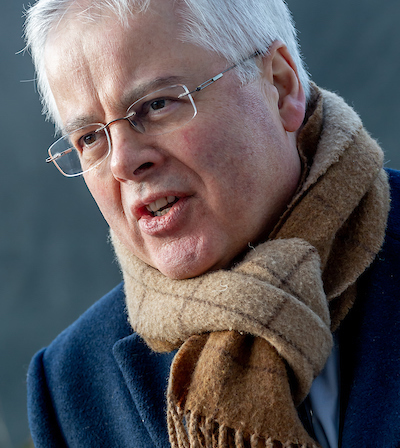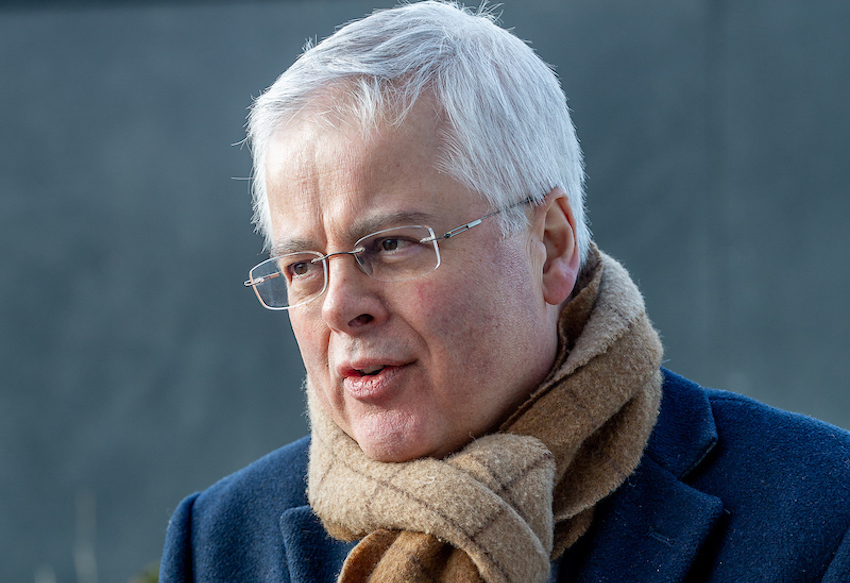

For 12 years, he’s been the man most associated with Jersey’s finance industry. Whether it's promoting the island abroad, speaking up at home, or giving hundreds of media interviews ranging from the soft and fluffy to the hard-nosed and confrontational, Geoff Cook has been the voice of finance, Jersey-style.
He took up the role just before the global financial crash, and since then has ridden through the twin storms of the Panama and Paradise papers, threats of blacklisting and regular regulatory inspections.
Meanwhile, Jersey Finance, both in terms of the promotional body itself, and the industry which pays the majority of the island’s bills, has continued to grow. He left Jersey Finance this month, to be replaced by Joe Moynihan.
Connect asked him where he saw the most progress during his time at the helm of the island’s dominant industry...
Geoff Cook: I think where real progress has been made is our market diversification. We've become a global international finance centre, as opposed to a UK finance centre, and that's made us a lot stronger, a lot more resilient.
Video: Geoff Cook is leaving Jersey Finance after 12 years at the helm. (Jersey Finance)
More than 50% of our new business now comes from outside of Europe and that diversification gives strength and resilience to the industry and has also helped us cope with things like Brexit.
Connect: It looks obvious, now. At the time, was it?
GC: No, it was difficult, actually. So, if you go all the way back, we did a little piece of work with London Business School. We didn't have any money for a big research project, I was newly into the role, only about a year in, a year or eighteen months, and wanted to do a big strategy review; we got three students from their summer consulting school who I worked with. Out of that, we formed the view that we needed to diversify our markets.
My main driver, at that time, was demographics. I felt that Europe would become more protectionist, because of the strain of public finances with an aging population, aging demographics and I thought that would make cross-border business more difficult. No prescience about the financial crisis, I'm afraid, at the time.
That has happened, actually, and we pushed out, initially, into the Middle East and further afield into Asia, more recently into Africa, now we've got the Americas on our horizons, and that's been a tremendously successful strategy for us.
I was in the Middle East recently, and the AMEA head of McKinsey said to me that, if you want private wealth structuring in the Middle East, you go to Jersey, or you go to Switzerland. If you'd asked them that question ten years before, we wouldn't have even been mentioned.

Pictured: Geoff Cook realised early on in this time at Jersey Finance that all business wouldn't be done through London and New York.
Connect: Why did people not initially understand the need to diversify?
GC: When you're doing well, it's often difficult to motivate people to lift their heads up, look into the future and be up for change. At the end of 2007, my first year in the role, when we first did this work, things were going really well. My board at Jersey Finance and captains of industry, when you said diversify, they'd say, “Hey, we're doing great, you know, we can get international business out of London. It's expensive going to the Middle East, you know, we can just get on a flight to London.” I said, “Well, it won't always be like that and, you know, we're too concentrated.” In the end, we did persuade them to make the initial investment.
Connect: How did the diversification actually take place?
GC: Well, I had the benefit of experience with HSBC, which is a global organisation and I knew, because of travelling around the world with HSBC, that Britain and British IFCs have certain inherent qualities that are attractive to people in further parts of the world.
It actually goes all the way back to the days of the British Empire. You know, the British Empire has a lot to lament, but one thing it did export and leave, in many parts of the world, was a strong civil service, the rule of law and the English language as a business language. So, I knew, because of that, our offer would resonate in these markets, if we're more proactive.
Also, it was evident to me that, as these markets became more sophisticated, they'd start making more of their own decisions in-market, in-region and it wouldn't all be done through London and New York, and that has actually happened.
So, I had the privilege, I guess, of working with some very bright people from London Business School, MBA students, but my own prior experience was already telling me, I'd already seen these changes beginning around the world and I just felt it was important we anticipated them and pre-empted them, really, we got there ahead of the change. I felt there was a first-mover advantage for us there, and that's proven to be the case.

Pictured: Geoff Cook says finance is "a strong, resilient industry and it's got a good future."
Connect: How has the perception of the industry within Jersey changed in the last twelve years?
GC: I think, over the decade, I would say, although we would always like it to be better than it is, that's an inevitability, it's better now than it was a decade ago.
I think the investment we've put into communicating with our home audience, particularly the younger end of the community, the work we've done in the schools, education, careers, trying to engage with our government and the elected representatives; you know, in the last election, we did education pieces for every candidate, irrespective of their political persuasion, because we want to have well-educated, well-informed, legislators who are going to invest in this industry.
For me, it's still the biggest opportunity for young Jersey people to have a worthwhile career, a good standard of living, the opportunity to travel the world and contribute to jobs, growth and prosperity, not just for themselves and their home community, but for other people, other nations as well. Money is the raw material of building economies. You put it to work, it creates jobs, growth and prosperity and that's what young people here can participate in. So, I'm pleased about that.
It's not perfect, there are still some in our community that would say finance is too big, it's too dominant, it's this, it's that, but the truth is, you know, it's 60% of our government's revenue, it's become more diversified and I think more resilient than it was as a consequence of what we've done, both in geographical diversification and in product and service diversification. It's quite a strong, resilient industry and it's got a good future, provided we're not complacent about that, provided we invest in it.

Pictured: Geoff Cook says he wishes Jersey Finance had established a "settled position" with Europe.
Connect: What do you wish you'd achieved?
GC: I'm not sure I could've done it on my own, we've certainly tried to make a contribution, but I don’t think we've got into a settled position with Europe. If I'd been staying on, that's something that I really feel we should be applying ourselves to, as a small nation.
My job isn't political, but we have a role with industry in Britain and in the European Union to try and engage with industry lobby groups. We've tried to do that over the years, with people like Invest Europe and others, we've been to Brussels and tried to explain what we do to parliamentarians. It's primarily our government's job, but I think it's unfinished business.
With Britain withdrawing from the EU, at the moment things are fine, because our bilateral third-country agreements are solid, they're in good shape, they give us continuing market access, but there are people in the European parliament, there are factions that aren't persuaded that we're a force for good and might be minded to try and encourage discriminatory action against us. That's a concern for the future and the longer term.
It's a difficult thing to address, because you've got two worldviews. You've got the social market, which the French often call the dirigiste view, which is that business primarily must be framed in the context of society and of government, and you have a lot of intervention, you have a lot of government control, it's heavily rules based, heavily regulated.
That contrasts with the Anglo-American system, which prevails in Britain and the US and which free market centres like Jersey would pursue, and that's about the free flow of capital, allowing capital to flow freely around the world for investment purposes to create jobs, growth and prosperity. I would say the Jersey approach is ‘enterprise first;’ I would say that the continental European view is one of ‘control first.’ They are different views, different worldviews, different systems and sometimes they don't actually coexist comfortably.

Pictured: "In an ideal world, we would be able to innovate faster than we do," says Geoff Cook.
Connect: What else was on your list that you didn’t manage to resolve?
GC: I think, in an ideal world, we would be able to innovate faster than we do. I think we have made some progress on that. So, in any society, you've got a competition for finite resources, inevitably, it's just the very nature of things. So, when I first started in this job, it would take us around two years, sometimes longer, to bring new products to market which had a legislative base. That's improved, but the world we live in now is so digitally enabled, things happen so much faster.
You know, trends evolve faster, client demands change faster and I'm not sure we've quite kept up with that, as a jurisdiction. I don't think most jurisdictions have, by the way, but if you want to sustain competitive advantage, the biggest single advantage I believe Jersey has is that it's big enough to matter, but small enough to be agile, if it's connected internally. A lot of the time it is, but sometimes it isn't. There are some things we could've brought to market sooner that would've given us, I think, quite a significant impact.
Connect: What's on the ‘to do’ note left in your desk drawer for your successor?
GC: Well, the thing I had in mind while I was describing that was the limited liability company. So, we've had that idea for quite a while now, we got the legislation through, but we need investment now in our company registry. That's nobody's fault, you know, as I say, we don't have unlimited resources, but that would be good to get that through. If we're going to, in the best, positive sense of the word, attack the Americas and really exploit and address the opportunity in North America, we need to develop some product offerings that look familiar to an American market and the limited liability company's one of them.

Pictured: Geoff Cook recommends his successor be future oriented.
Connect: What advice would you give whoever is chosen to follow on from you?
GC: Well, I think you've got to be very active in terms of engagement with stakeholders across the community. One of the things we've done, because it's an export industry, you focus on overseas, so you're travelling around the world, you're trying to educate and inform on what Jersey has to offer and encourage people to use the jurisdiction.
I think we've had a good measure of success in that, but it's important not to forget, like all armies, your supply chain is very important, so you've got work on your home community, educating and informing them and, you know, given them the appropriate amount of time and respect. Unless the local community is supportive of our industry, young people won't want to come into it and politicians won't want to vote funds to invest in it.
So, I suppose, the counsel I would give to my successor is be balanced about that, in terms of your proportion of time and investment. The other thing I would counsel is look to the future, you know, be future oriented, be scanning the horizon, both for new opportunity and challenge, because as small nations, you have to live on your wits and be agile.
Connect: What's the one thing you really hope we avoid in the next six months, and what's the one thing you hope we achieve?
GC: I think the thing that it's absolutely vital for us to avoid is a red card. We've got a great team in Jersey, we can compete around the world and do really well, but we've got to be allowed on the pitch to do it. So, market access, particularly as far as the European Union is concerned, we're at a critical stage now with the code of conduct on business taxation, we've made big efforts again to demonstrate our transparency and substance credentials, they should be accepted and supported; but you know, if they weren't, then that would be quite challenging for us. So, that will be the biggest challenge, I think, in the short to near term.
The biggest opportunity, I think, is a combination of addressing market opportunity. That lies in Britain, with a newly rebased Britain outside of Europe, it lies in America. Americans find Europe puzzling, from a regulatory point of view. We can help them with market access to Europe and with investment opportunity. Now that you've got CRS and FATCA, any concerns about non-disclosure and getting the wrong kind of US business have been greatly managed back, managed down, so America's a big opportunity for us; and pressing home on our advantage in the growth markets, so that would be Asia, the Middle East and Africa.
Connect: How do you look back on your time at JFL?
GC: It's been an honour and a privilege to do this job, because it's taken me all over the world, I've met presidents and prime ministers and heads of regulatory authorities and captains of industry. What I feel proud about is that I've played a role in contributing, with industry and the other stakeholders, the regulator and the government, in driving Jersey forward to be a global financial centre that's respected around the world and that is highly successful.
This article was first published in Connect, read the February issue online by clicking here.
Comments
Comments on this story express the views of the commentator only, not Bailiwick Publishing. We are unable to guarantee the accuracy of any of those comments.